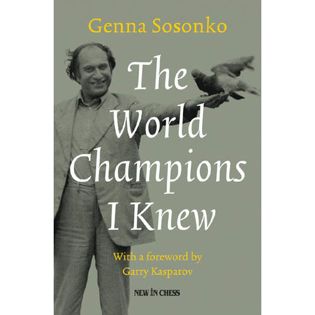World Champions I Knew, The
Genna Sosonko

Some grandmasters can write with humor and wit, some can write in academic fashion, some write in a dry no-nonsense manner that efficiently gets their point across, and some cant write at all. But Ive only seen two grandmasters that wrote prose that I would view as true literature. Those grandmasters are Jan Hein Donner and Genna Sosonko.
The late Donners work can be enjoyed in his magnificent collection, The King. Sosonko has already staked his claim as the preeminent living literary writer in chess with his three masterpieces, Smart Chip From St. Petersburg, The Reliable Past, and Russian Silhouettes. Now hes outdone himself with his new book, The World Champions I Knew.
The subject matter is all about World Champions. In fact, even the foreword was written by a World Champion (Garry Kasparov)! The contents:
I Knew Capa Jose Raul Capablanca
The Paris Years Alexander Alekhine
The Professor Max Euwe
Homo Politicus Mikhail Botvinnik
Death, Where Is Thy Sting? Vasily Smyslov
A Name as a Gunshot Mikhail Tal
The Overcoat Tigran Petrosian
The Caretakers Son Tigran Petrosian
The Main Thing Is Happiness Tigran Petrosian
Whats particularly interesting about this book is that theres minimal discussions about chess, the vast majority of material being about the hidden aspects of these great men their personalities, they private lives, their relationships, their idiosyncrasies.
The writing styles of Donner and Sosonko couldnt be further apart. Where Donner is caustic, confrontational, impish, politically incorrect, earthy, shocking, nasty, and very, very funny (all the things I love in a writer!), Sosonko is delicate, kind, emotional, gentle, and wields his pen in a charming old world manner. Both men see the world deeply, but through very different lenses, and Sosonkos penetrating insights towards the World Champions mentioned above are extremely moving and, at times, even heart breaking. Most importantly, where other writers could easily become syrupy or maudlin, Sosonko unerringly stays on his path of exploring the previously unknown lives of his subjects, never judging, but never shying away from unflattering facts either.
Though I devoured every bit of this book, and loved every single chapter (I was lucky enough to spend time with Tal, analyze with Petrosian, and play Smyslov, so reading about these gentlemen is always of great interest), I was most taken by the pages on Capablanca, as told to Sosonko by his widow, Olga Clark. An interesting character in her own right, her reminisces carried significant emotional punch, and I gained a whole new level of understanding concerning the great Cuban.
Here are some examples of that initial chapter:
In 1984 in New York I met for the first time with Capablancas widow, Olga Clark. And now, examining the notes of those years, hearing her voice recorded on tape, and travelling back in time, I see people who have long been gone, and in particular Calablanca himself.
In our conversations she always called him Capablanca, or Capa, but never Raul or Jose, forms of address which often occurred in letters to him, which she bequeathed to the Manhattan Chess Club.
I did not venture to ask about her age, although it was evident that she had long since reached that age when one takes pride in ones years, rather than hides them. It used to be thought that she had been born in 1900. It was only after her death that I learned the exact date of her birth. Olga Evgenyevna Chubarova was born in the Caucasus on 23 September 1898. At the time of our meeting she was not far short of eighty-six years old.
Olga Clark had many fascinating things to say. The following will give you a small taste of the treasures she shared in the books pages:
So, it was at this party that I met Capablanca. What was he like? You must understand, he was a king. And in every way he conducted himself like a king. When before some simultaneous display someone asked them to point out Capablanca, they said to him, When they all enter the hall, you yourself will see who is Capablanca. In Belgium Capablanca was at a diplomatic reception, and, being a diplomat, he had to be presented to the Belgian King. A minister later told me that, when the King heard Capablancas name, he ran up to Capa like a child, which was contrary to all protocol. The King showered him with compliments: I know your games, and now, what an honor, I am seeing you in person. He was liked by everyone, and he had good relations with everyone, except, of course, Alekhine. I first saw Alekhine somewhere near Carlsbad, I think it was in 36. It was summer, and there was some party in a garden. I was talking with Stahlberg, who Capa had just introduced me to, but a few minutes later we were approached by some man with disheveled hair, who looked like a shop salesman. It was Alekhine. Was he attractive? On the contrary, he was rather unsavoury. I immediately recognized him from photographs, Capablancas sworn enemy, and I froze on the spot.
If you love chess history, or history in general, or if you simply want to know more about some of your chess heroes, this book is a must buy. Beautifully written and rich with amazing content, I give Sosonkos The World Champions I Knew my highest recommendation.
